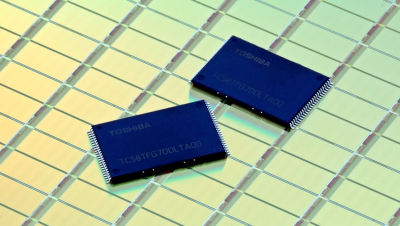Toshiba Corporation today announced that it has developed the world’s first 15-nanometer (nm) process technology, which will apply to 2-bit-per-cell 128-gigabit (16 gigabytes) NAND flash memories. Mass production with the new technology will start at the end of April at Fab 5 Yokkaichi Operations, Toshiba’s NAND flash fabrication facility (fab), replacing second generation 19 nm process technology, Toshiba’s previous flagship process. The second stage of Fab 5 is currently under construction, and the new technology will also be deployed there.

Toshiba has achieved the world’s smallest class chip size with the 15nm process plus improved peripheral circuitry technology. The new chips achieve the same write speed as chips formed with second generation 19 nm process technology, but boost the data transfer rate to 533 megabits a second, 1.3 times faster, by employing a high speed interface.
Toshiba is now applying the 15nm process technology 3-bit-per-cell chips, and aims to start mass production in the first quarter of this fiscal year, to June 2014. The company will develop controllers for embedded NAND flash memory in parallel and introduce 3-bit-per-cell products for smartphones and tablets, and will subsequently extend application to notebook PCs by developing a controller compliant with solid state drives (SSD).
Toshiba continues to closely follow its process technology development roadmap and will strengthen product competitiveness and performance by applying leading-edge process to production. Looking to the future, Toshiba will reinforce its market leadership by promoting product innovation and development and ensuring that it is able to respond to a wide variety of clients' product needs, including smartphones, tablets, slim notebook PCs and enterprise products requiring high reliability, including SSD for data centers.

